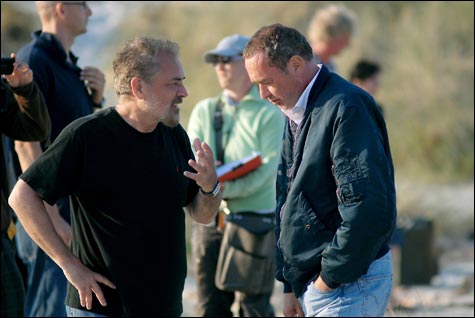
GUERRILLA GIRLS There were always more women than men in the movement. . . . The heads were all women. It was a movement dominated by women. |
We reached director Uli Edel in Berlin to talk about the Red Army Faction and the culture that spawned it.Describe the mood among your generation in the late '60s.
We were the post-war generation, the generation of youth who accused their parents of having helped the Nazi regime rule for 12 years. You have to understand that to resist any notion of fascism in our country was, at that time, very important. Don't forget that before Willy Brandt we had a president with a Nazi past. These people were in power. You had the impression that fascism was still around. The same politicians were in power, the same judges were in power. We didn't trust this generation at all.
But the Red Army Faction took that vigilance a bit far.
For sure, the RAF definitely overreacted. This was a small group of militant students who became very brutal and went far over the top. They started to rob banks, and I was very curious how far they would go. Then the first bombs exploded. The confusion was immense. We [the student left] couldn't believe it. I couldn't believe it! Couldn't believe that Ulrike Meinhof, whom I admired very much as an intellectual, as a writer, as a journalist, would go that far.
Andreas Baader, on the other hand, was not very politically motivated. He seemed in it more for the adrenaline.
He was not politically motivated at all. He was this sort of adventurer. He drifted through Berlin. He was no intellectual at all. So when he met [RAF co-founder] Gudrun Ensslin, he met his match. Gudrun was this person who had all these ideas, and Baader would just do it. He didn't want to discuss it: "I cannot fucking discuss this for a minute; we make a decision and we do it." All his knowledge about what they did, he basically read or studied later when he was in prison for all these years. In his cell he had up to I think 940 books, I think.
There were a lot of women in the RAF — more than you might expect from a terrorist group.
There were always more women than men in the movement. I interviewed six of the terrorists who were still around, or were out of prison by now. And they all said it should not have been called the Baader-Meinhof Group, it should have been called the Meinhof-Ensslin-Mohnhaupt Group. The heads were all women. It was a movement dominated by women.
Why do you think that was?
I have no answer.
The film has provoked a controversial reception in Germany.
When you do a movie like this, you know a lot of people have their opinions. You just have to do what I did: to re-create the way that I reacted to the RAF when I was 20, 21, 22 — how I felt. You can see it in the movie, too, that my heart is with them in the beginning, until the first bombing happens.